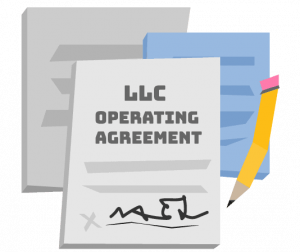How to Start an LLC in Ohio
Starting a limited liability company (LLC) in Ohio means your business can take advantage of liability protection, a variety of tax options, and a flexible management structure. In Ohio, it only costs $99 to start an LLC, and there are no annual report requirements or fees.
To get your LLC started, you’ll need to fill out paperwork known as Ohio Articles of Organization, then submit those articles to the Ohio Secretary of State. You can tackle the paperwork yourself or hire someone like Northwest to do it on your behalf. Once the paperwork is submitted, you’ll need to take other steps to protect your privacy and get your LLC in good working order. Here’s how to get it done.

1. Name Your LLC
Your LLC won’t get very far without a name. Ohio has specific rules laid out in Ohio Rev. Code § 1706.07, but there are a couple of key things to remember. Your LLC’s name must:
- Contain the words limited liability company or an abbreviation like LLC or L.L.C.
- Be unique among registered business names in Ohio
If your name is too similar to a name that already exists, your application won’t be accepted. You can use the Ohio Secretary of State’s office to search business names in Ohio and check on your preferred name.

2. File Ohio LLC Articles of Organization
Articles of Organization are the form you submit to the Ohio Secretary of State. Once you submit your Ohio Articles of Organization (LLC), the Secretary of State’s office will check it for any issues. If there are none, the state will approve the Articles, and your LLC will officially be formed.
You’ll need to list the following info on your Ohio Articles of Organization:
Don’t forget to include the indicator limited liability company or an approved abbreviation like LLC. Make sure your name hasn’t already been claimed.
This is optional, so feel free to bypass this section if you want to start your LLC immediately. Otherwise, you can note a date and time up to 90 days in the future.
You can leave this blank or add in a generic business purpose such as to engage in lawful business activity in Ohio.
This is another optional section. If you want your LLC to dissolve automatically after a certain date, list that date. Otherwise, don’t write anything here.
Statutory agent is a term Ohio often uses in place of Ohio registered agent. A registered agent is a person or company authorized to receive official mail on your LLC’s behalf. Why is a registered agent important? Because if you get served with a lawsuit, the registered agent is the person or company who will be receiving it at the address they list here.
Once they receive it, it’s the registered agent’s job to get that lawsuit paperwork to you ASAP. You’re legally required to appoint a statutory agent in Ohio, so there’s no avoiding this section.
Legally, your Ohio statutory agent must:
- Have a physical address in Ohio
- Be present at that address during regular business hours
- Agree to accept service of process for your LLC, and notify you of that service of process in a timely manner
If you meet the above requirements, you can act as your own registered agent in Ohio. If you’re not present all day at one address or would rather live privately with your LLC, you can hire a professional like Northwest to act as your Ohio registered agent.
Your statutory agent will also need to sign this section of the Articles to signal they’ve accepted their appointment.
A member, manager, or someone else authorized to act on your LLC’s behalf should sign here. This doesn’t have to be someone involved in your LLC.
Note: All of the information on this form becomes part of the public record. You can hire a professional registered agent and keep your personal information private.
How do you file Ohio Articles of Organization?
When we say file, we just mean submitting your LLC paperwork to the Ohio Secretary of State. You’ll also have to pay a $99 filing fee, or more if you want expedited service. You can choose to submit your Articles by mail, online, or in person.
File online here:
Ohio Business Filings
Send by mail here:
P.O. Box 670
Columbus, OH 43216
For two-day processing time, send here (for an extra $100):
P.O. Box 1390
Columbus, OH 43216
For in-person service, go here
Client Service Center
180 Civic Center Dr.
Columbus, Ohio 43215

3. Adopt an Operating Agreement
An operating agreement is a guidebook for how your LLC will operate. It covers how the LLC will do things like vote, resolve disputes, and allocate profits. If someone wants to transfer their interests to another member, that should also be covered in the handbook.
An operating agreement is an internal document, so you don’t have to file it with the state. In fact, Ohio doesn’t even legally require one, but if you don’t create one now, you’re setting yourself up for trouble down the line. Without an operating agreement, you’ll be governed by Ohio’s default LLC statutes, which may not be the best fit for your LLC.
Tip: Writing an operating agreement doesn’t come naturally. So we had our attorneys draft an Ohio LLC operating agreement template, and you can customize it for free.

4. Get an EIN
Your LLC probably needs an Employer Identification Number (EIN). It’s a nine-digit number assigned by the IRS to your business. You need an EIN to pay taxes, but also to do things like open bank accounts and apply for loans. Listing your EIN on forms is also safer than listing your personal Social Security number.
You can apply for an EIN through the IRS website. If you don’t want to deal with the IRS any more than necessary, you can hire us to obtain an EIN for you.

5. Get a Business Bank Account
Personal finances and business finances shouldn’t mix. If they do, then a court could find you personally liable for any judgments against your LLC. To avoid that scenario, you must open a business bank account. When you go to open your account, you’ll want to bring your operating agreement, EIN, and an LLC Resolution to Open a Bank Account.
*This is informational commentary, not advice. This information is intended strictly for informational purposes and does not constitute legal advice or a substitute for legal counsel. This information is not intended to create, nor does your receipt, viewing, or use of it constitute, an attorney-client relationship. More information is available in our Terms of Service.

